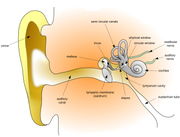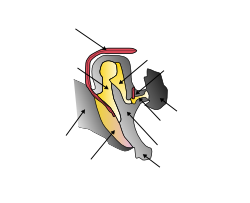Hear, hear!
I participated in a study at the University of Washington's Virginia Bloedel Hearing Research Clinic, and it was quite interesting.
I volunteered to help the study, assuming my hearing is normal so my responses could be measured as part of the normal hearing group - against which they can test to help hearing impaired individuals with the research they're conducting.
First, I had to undergo an extensive hearing test to determine whether, indeed, my hearing is normal so I can be properly classified and actually used for the test.
Interestingly, when I am completely relaxed - like when I receive a massage, I experience my hearing ability at almost dog sensitivity because all volume has to be lowered to near zero decibels or it's too loud for me.
Sure enough, my hearing's in great shape.
Then I went through a series of tests identifying sounds related to tones, music and instruments. It was challenging and ignited my desire to do more research for fun about those things to keep my hearing sharp in relation to music, which is good for my work as a film director because I collaborate with fantastic composers and come up with a sense of what type of music fits each project.
about those things to keep my hearing sharp in relation to music, which is good for my work as a film director because I collaborate with fantastic composers and come up with a sense of what type of music fits each project.
I wasn't paid for my participation, I only did it for the good of science and helping folks whose hearing isn't as sensitive as mine. It took a couple hours of my time - including travel - and the results will help hearing impaired people.
If you're interested in participating in scientific research that will help others, chances are you live near a University, School of Medicine or other institution that can use your assistance in their research. I know schools and research clinics are always looking for subjects, even to - as in my case - establish a normal base line from which to evaluate research tools that increase the effectiveness of study tools.
To find research studies in which you might care to participate, just write "research study seeking participants" and add the University, College, School of Medicine or whatever institution conducting research is in your community in your search engine.
Sometimes there's pay for research participation, sometimes there's discomfort, sometimes it takes a couple hours, sometimes longer; sometimes you have to keep records at home, sometimes they take samples of blood or urine or hair or whatever they need.
You have to decide what level you wish to participate regarding time, discomfort, etc. I believe it's important for those of us who know, love or are related to people who suffer from certain conditions to pitch in with research that might help them in their lifetime.
Or at least try to prevent future generations from suffering as our friends and loved ones have.
I volunteered to help the study, assuming my hearing is normal so my responses could be measured as part of the normal hearing group - against which they can test to help hearing impaired individuals with the research they're conducting.
First, I had to undergo an extensive hearing test to determine whether, indeed, my hearing is normal so I can be properly classified and actually used for the test.

Interestingly, when I am completely relaxed - like when I receive a massage, I experience my hearing ability at almost dog sensitivity because all volume has to be lowered to near zero decibels or it's too loud for me.
Sure enough, my hearing's in great shape.
Then I went through a series of tests identifying sounds related to tones, music and instruments. It was challenging and ignited my desire to do more research for fun
 about those things to keep my hearing sharp in relation to music, which is good for my work as a film director because I collaborate with fantastic composers and come up with a sense of what type of music fits each project.
about those things to keep my hearing sharp in relation to music, which is good for my work as a film director because I collaborate with fantastic composers and come up with a sense of what type of music fits each project.I wasn't paid for my participation, I only did it for the good of science and helping folks whose hearing isn't as sensitive as mine. It took a couple hours of my time - including travel - and the results will help hearing impaired people.
If you're interested in participating in scientific research that will help others, chances are you live near a University, School of Medicine or other institution that can use your assistance in their research. I know schools and research clinics are always looking for subjects, even to - as in my case - establish a normal base line from which to evaluate research tools that increase the effectiveness of study tools.
To find research studies in which you might care to participate, just write "research study seeking participants" and add the University, College, School of Medicine or whatever institution conducting research is in your community in your search engine.
Sometimes there's pay for research participation, sometimes there's discomfort, sometimes it takes a couple hours, sometimes longer; sometimes you have to keep records at home, sometimes they take samples of blood or urine or hair or whatever they need.
You have to decide what level you wish to participate regarding time, discomfort, etc. I believe it's important for those of us who know, love or are related to people who suffer from certain conditions to pitch in with research that might help them in their lifetime.
Or at least try to prevent future generations from suffering as our friends and loved ones have.
Labels: hearing testing, helping science, participation in research studies, research, study

0 Comments:
Post a Comment
<< Home